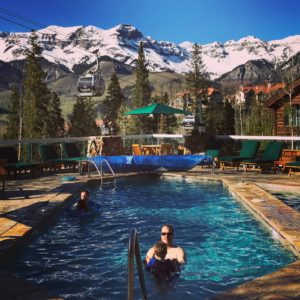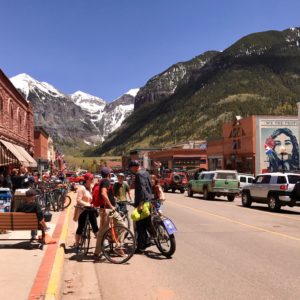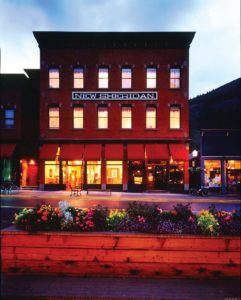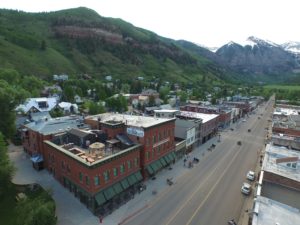Colorado Health & Fitness Hotels & Lodging Mountain Living Telluride The Rockies: altitude sickness Colorado Diamox Don Bowie Dr. Peter Hackett Institute for Altitude Medicine lodging Telluride Mountain Lodge New Sheridan oxygen therapy traveling to elevation
by maribeth
Comments Off on Dealing with Altitude Issues at Our High Mountain Destinations
Dealing with Altitude Issues at Our High Mountain Destinations

Almost Summer at Mountain Lodge Telluride

The Town of Telluride, Colorado: Fun at 8,750 Feet

Me Feeling Happy and High at the Delightful Rooftop Bar at the New Sheridan Hotel
I’m long overdue in talking about how to combat the effects of high elevation with you. I apologize. Please forgive me.
In some ways, I’m new to the game myself. Although I’ve lived at heights as great as almost 10,000 feet for fifteen and a half years, I’m somewhat new to a magical little pill that has made a world of difference for me: It’s a diuretic called Diamox.
It was just a year ago that I began taking Diamox, a prescription medicine long touted to me by my ski clients but somehow I was lax in asking my doctor for a script. I finally did last spring and have used it many times this past year as I’ve traveled in and out of Telluride many times. At the risk of sounding like a drug pusher, ask your doctor about it and see if it’s good for you.
In other ways, I’m not at all new to the effects of elevation on my body. I think I first felt them when I went to the Alps during the time I was living in France. I was slammed with a headache that carried all the force of an avalanche down Mont Blanc. Ever since then, I take precautionary aspirins when I first arrive at elevation, even before the head pounding sets in.
But the Alps are nothing–at least in terms of height–to the Rockies. And I found that out when I moved here. Sure, after a few days I adjust to our thin air (about 30% less oxygen when you’re at over 9,000 feet), but if I leave a high destination for over a week, I have to reacclimatize each time, sometimes with effects worse than other times.
It’s no wonder I was fascinated with a Travel Fun interview I did many years ago with Dr. Peter Hackett, a world renowned high altitude expert and director of the Institute for High Altitude Medicine here in Telluride. I am rebroadcasting that interview on KOTO at 6:30pm MST today. Dr. Hackett, a leading authority on altitude illness with years of experience on big expeditions in Colorado, the Himalayas, Denali and South America, talks about his experiences along with, Don Bowie, one of the world’s top climbers. Don also shares sketchy elevation issues he has succumbed to during some of his adventures. It’s important to note that elevation sickness is genetic; it has nothing to do with what kind of shape you’re in.

My Friend Margie Shopping at Christy Sports in Telluride: A Good Alternative to Skiing
Elevation sickness is also very random; it can hit you once very hard and never hit you again.
Here are some tips from my personal experience and from what Dr. Hackett shares on how to combat altitude sickness:
-Diamox, Diamox, Diamox. If, of course, your doctor feels it’s right for you.
-There are herbal supplements out there as well, however, I have heard they provide mixed results.
-Consider spending the first night of your Rocky Mountain stay at a lower elevation such as Denver (5,280′), Grand Junction (4,583′), Montrose (5,807′) or Durango (6,512′).
-Drink lots of water throughout your stay and avoid imbibing in alcohol the first day of your arrival. (I know that’s not an easy thing to do, especially if you’re flying in for a wedding or other fun celebration. With Diamox, I can pretty much do what I want.)
-Take the precautionary aspirin or other headache remedy before the effects of elevation set in. I also recommend taking a sleep remedy such as Tylenol PM, since insomnia can also be an effect of high elevation. Be careful though because some of these medications dry out your nasal passages, which can also be a problem in our dry Western nosebleed-inducing environment. (Without getting off topic, make sure you have a saline spray and put a humidifier next to your bed at your place of lodging.)
-Plan to do easy activities your first day or two. When my friend, Margie, visited me from Phoenix at the end of ski season, for example, we shopped and lolled around at our comfy hotel room at the beautiful Mountain Lodge the first two days and then hit the slopes the second two. (I felt awful that I forgot to give her ample notice about obtaining a script for Diamox.)
-Give yourself an oxygen boost, typically provided by a spa. Atmosphere Spa in Telluride offers this service, which I’ve been told is quite helpful. (Don’t bother, however, with the oxygen in a can–it’s more of a gimmick than anything else.)

Altitude Sickness Can Make You Feel Blah
-Have oxygen delivered to your place of lodging. Alpine Oxygen services all of Colorado’s major resort towns.
-Consider doing a session in a hyperbaric chamber. Most of the mountain towns have a business that offers these treatments. In Telluride and nearby Ridgway, Colorado, you can find them at Balance Natural Medicine.
For more tips on combatting elevation problems and much more information on the effects of altitude on your body, consult the high altitude health page at the Institute for High Altitude Medicine.
Know that I’ve met many people that have little to no effects from high elevations. But as with all aspects of travel, it’s always good to be prepared.

The Historic New Sheridan Hotel in Telluride

Hanging at Mountain Lodge Telluride with Margie
My Telluride Hotel Recommendations
If you follow my blog, you know that two of my all-time favorite properties in Telluride, Colorado are Mountain Lodge Telluride and the New Sheridan Hotel. Located in Mountain Village Telluride at an elevation of 9,545 feet, Mountain Lodge requires more acclimatization than the New Sheridan, which is located in the town of Telluride at 8,750 feet. (As Dr. Hackett says, “It’s where you sleep that matters most. And every increment of 1,000 feet over 7,500 feet can make a difference.”)

Aerial View of the Sheridan Rooftop Bar and Main Street Telluride
So I recommend that you keep this in mind when choosing your lodging at our mountain towns. Each property has a mountain of other criteria that should also come into play when making your lodging choice. Mountain Lodge provides an elegant mountain experience with spacious living quarters replete with fully-equipped kitchens. On the other hand, the New Sheridan offers an abundance of charm within an historic property. If you’re looking for calm, choose Mountain Lodge. If you want to be more in the thick of life in a mountain town, choose the New Sheridan. And depending on the season, there are many other considerations to weigh as well. I love them both!

Thumbs Up for the Service at Mountain Lodge Telluride
Note, too, that if you are not going to Telluride, go through a similar decision-making process with other mountain towns. In other words, in addition to the property’s locale and a host of other factors, be sure to ask about the elevation.
But once again, with Diamox, there are no worries. Hmmmm. Maybe I should buy some shares in that pharmaceutical company.
Wishing you good health in our high and strikingly beautiful Rocky Mountain towns!


